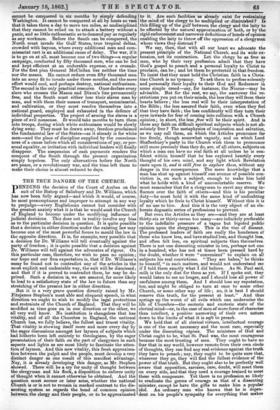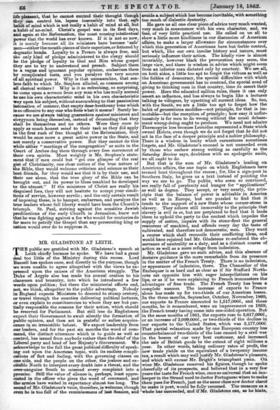THE TRUE DANGER OF THE CHURCH.
PENDING the decision of the Court of Arches on the suit of the Bishop of Salisbury and Dr. Williams, which has now been fully argued—and which it would, of course, be most presumptuous and improper to attempt in any way to prejudge—every Englishman cannot but consider with the greatest anxiety what it is that he would wish, the Church of England to become under the modifying influence of judicial decisions. This does not in reality involve any bias as to the particular decision in question. It is quite possible that a decision in either direction under the existing law may become one of the most powerful forces to mould the law in the opposite direction. It is, for example, very possible that a decision for Dr. Williams will tell eventually against the party of freedom ; it is quite possible that a decision against Dr. Williams will tell against the advocates of rigour. On this particular case, therefore, we wish to pass no opinion ; our hope and our firm expectation is, that if Dr. Williams's essay be found not to contradict any of the articles in the most explicit and undeniable way, the suit will be dismissed; and that if it is proved to contradict them, he may be de- prived. Such a decision is, we are assured, far more likely to lead to a satisfactory state of the law in future than any stretching of the present law in either direction.
But it is a very grave question directly raised by Mr. Fitzjames Stephen's most able and eloquent speech, in what direction we ought to wish to modify the legal protections and restraints of the Church of England. That they will be modified as time goes on in one direction or the other, we all very well know. No institution is changeless that has vitality, and of all the Churches in England, the national Church has, we fully believe, the fullest and truest vitality. That vitality is showing itself more and more every day by the eager discussions amongst her laymen of subjects which had hitherto been left entirely to theologians, by the eager presentation of their faith on the part of clergymen in such aspects and lights as are most likely to fascinate the atten- tion of laymen. And this new vitality, this fresh approxima- tion between the pulpit and the people, must develop a very distinct danger as one result of this manifest advantage. Nay, it is already developing this danger, as Mr. Stephen showed. There will be a cry for unity of thought between the clergyman and his flock, a disposition to enforce unity of thought when it cannot otherwise be obtained. And the question must sooner or later arise, whether the national Church is or is not to remain in marked contrast to the dis- senting system as regards the bond of common opinion between the clergy and their people, or to be approximated to it. Are such facilities as already exist for restraining the mind of the clergy to be multiplied or diminished? Is this filling up of the gulf between the clergy and the laity to be effected by the natural approximation of both, or by the rigid enforcement and narrower definitions of bonds of opinion enabling the laity to throw off the oppression of a clergyman whose views they distrust ?
We say, then, that with all our heart we advocate the present principle of the National Church, and its wide ex- tension, not its contraction. Let the clergy be as free as men, who by their very profession admit that they have God's gospel to preach and a personal loyalty to Christ to proclaim, can be ; and let them be protected in that freedom. To insist that they must hold the Christian faith in a Chris- tian Church is no tyranny. To ask them to profess solemnly and personally their loyalty to their God and Redeemer in some simple creed—say, for instance, the Nicene—may be advisable. But for the rest, we say, the narrower the re- strictions you put on their minds, the less they will from their hearts believe ; the less real will be their interpretation of the Bible ; the less assured their faith, even when they feel that they have faith ; the less confidently will they turn their eyes inwards for fear of coming into collision with a Church opinion ; in short, the less free will be their spirit. And is there any faith on difficult spiritual subjects which is not ab- solutely free ? The metaphysics of inspiration and salvation, as we may call them, on which the Articles pronounce far too freely, though somewhat vaguely, and on which Lord Shaftesbury's party in the Church wish them to pronounce still more precisely than they do, are, of all others, subjects on which a man can have no real faith at all unless he is con- fident within himself that he has explored heartily every thought of his own mind, and any light which Revelation casts upon it, and is still free to explore them, without any danger in the consequences. The mere knowledge that a man has shut up against himself one avenue of possible con- viction is, on such a subject, enough to make him hold what he holds with a kind of uncomfortable reserve. We must remember that for a clergyman to exert any strong in- fluence over the faith of others—and this is his peculiar duty—he must hold it with the same kind of undoubting loyalty which he feels to Christ himself. Without this it is of no use to him. And this it is the very object of an ela- borate dogmatic series of professions to prevent.
But even the Articles as they are—and they are at least thirty-six or thirty-seven too many—are infinitely preferable to the indefinite pressure of a vague but bigoted public opinion upon the clergyman. This is the vice of dissent. The professed leaders of faith are really the bondsmen of those who know less, and have studied less, and thought less, and often felt less, on spiritual subjects than themselves. There is not one dissenting minister in ten, perhaps not one in a hundred, who has not at times been pressed hard by the doubt, whether it were "convenient" to explain on all subjects his real convictions. "They are babes," he thinks to himself, "in such matters, and would not understand me if I told them exactly what I did believe. As St. Paul said, milk is the only diet for them as yet. If I spoke out, they would listen to me no longer, and I should lose all power of usefulness among them. And I should lose my reputation, too, and might be obliged to turn at once to some other Church, or some other way of life ; no, it is best I should reserve this truth, for the present at least." And thus springs up the worst of all evils which can undermine the life of Churches—the esoteric and exoteric state of the clerical mind—or, in the case of men of more force of character than intellect, a positive narrowing of their own nature down to the limits of what it is safe to preach.
We hold that of all clerical virtues, intellectual courage is one of the most necessary and the most rare, especially under the dissenting regime. The ministers of God and Christ ought to be, what St. Paul was, the most courageous because the most trusting of men. They ought to have no fear that in any world, however remote from their own circle of thoughts, they can find any real evidence against the truth they have to preach ; nay, they ought to be quite sure that, wherever they go, they will find the fullest evidence of the power of that truth. But they ought also to be perfectly well aware that opposition, sarcasm, care, doubt, will meet them on every side, and that they need a courage trained to meet these with composure. Yet there is no profession so likely to eradicate the germs of courage as that of a dissenting minister, except he have the gifts to make him a popular idol. An ordinary man who knows that he is depen- dent on his people's sympathy for everything that makes life pleasant, that he cannot control their thought though they can control his, lapses insensibly into that safe habit of mind which is not really a habit of mind at all, but a habit of no-mind. Christ's gospel was in its first days, and again at the Reformation, the most rousing intellectual power that the world has ever known. If it is not so now, it is mainly because all its ministers have become 'safe' men—either the mouth-pieces of their superiors, or fettered by dogmatic bonds. Loyalty to a Person is always free, and the only kind of pledge administered to the clergy should be the pledge of loyalty to God and Him whose gospel they are to try to understand and preach. Subject them to a vague and ignorant popular opinion, embarrass them by complicated tests, and you paralyze the very source of all spiritual power. Why is that unmasculine, that sex- less faith to which Mr. Stephen alluded, so common among All clerical writers ? Why is it so refreshing, so surprising, to come upon a sermon from any man who has really seemed to use his own characteristic mind in his own characteristic way upon his subject, without suecumbing to that passionless intonation of manner, that empty dear-brethreny tone which is so offensive to any one who feels what it means? Surely be- cause we are always taking guarantees against ministers and clergymen being themeelves, instead of demanding that they shall be themselves and no others. Were they. once to apply as much honest mind to their task as they did apply in the first rush of free thought at the Reformation, they would be once more a great active power in the State, and not merely a conservative power. But they cannot do this while either "meetings of the congregation" or suits in the Court of Arches dog them through every free movement of their own spirits. Most weighty is Mr. Stephen's state- ment that if men could but "get one glimpse of the real gist of Christianity, one clear notion of the true nature of the Bible, they would welcome criticism and science as their best friends, for they would see that it is by their use, and their use alone, that the true glory of the Bible can be brought out, and its power to bless mankind be developed to the utmost." If the ministers of Christ are really his disguised foes, they will not hesitate to accept your condi- tions of service, however servile ; and the only certain result of imposing these, is to hamper, embarrass, and paralyze the true leaders whose full liberty would have been the Church's triumph. St. Paul, striving against the sensitive Jewish predilections of the early Church in Jerusalem, knew not that he was fighting against a foe who would for centuries do far more to petrify the Gospel than any perseeuting king or nation would ever do to suppress it.































 Previous page
Previous page